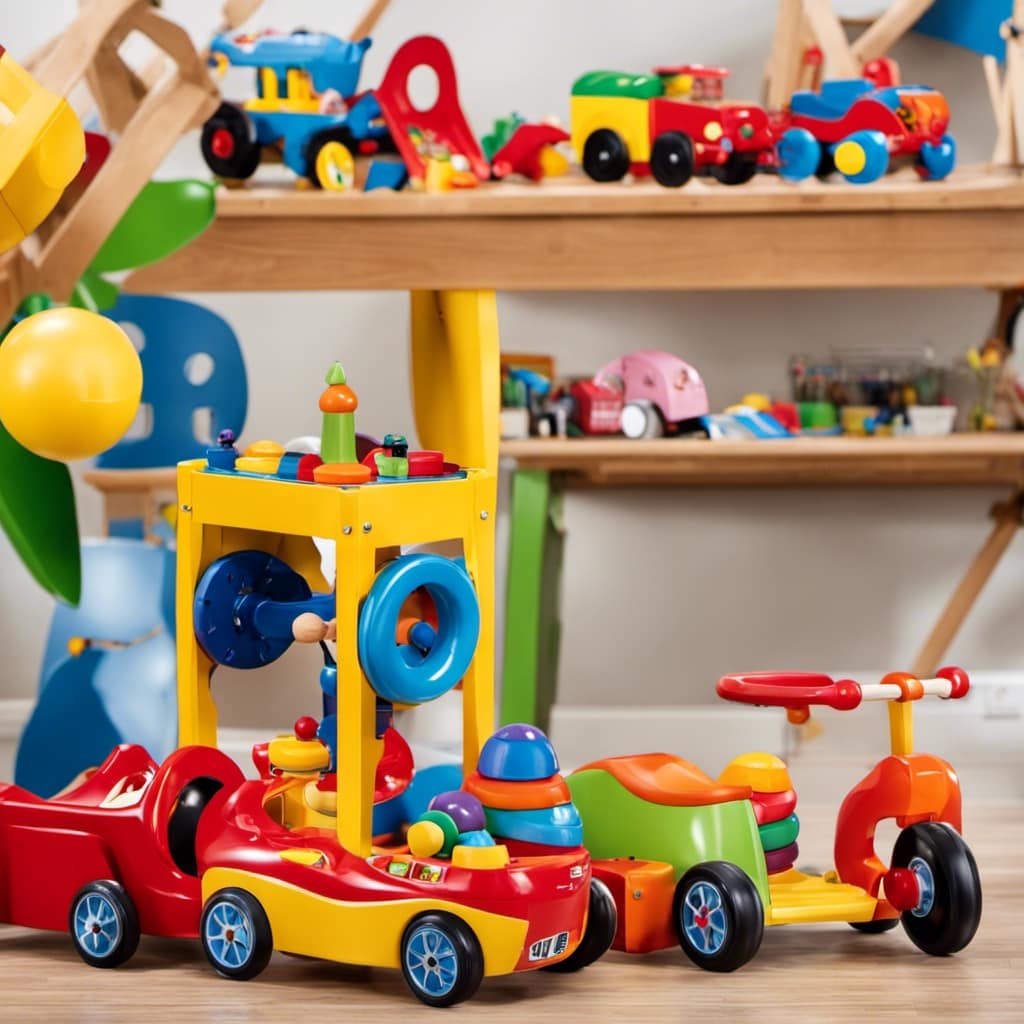I’ve always held the belief that play is not just a form of entertainment for children; it is an essential aspect of their growth and development. It is incredible how something as basic as play can greatly influence a child’s cognitive, social, emotional, and physical development.
As a preschool teacher, I have witnessed firsthand the transformative power of play in my students. In this article, we will explore the importance of play in preschool and how it fosters growth and development in children.
So let’s dive in and discover the incredible benefits that play brings to the lives of our little ones.
Key Takeaways
- Play is crucial for cognitive, social, emotional, and physical growth in preschoolers.
- Providing a variety of toys and materials in preschool settings supports children’s overall development.
- Play helps children develop problem-solving skills, creativity, and imagination.
- Outdoor exploration and imaginative play are important for fostering creativity, problem-solving skills, and physical development in preschoolers.
The Cognitive Benefits of Play in Preschool
Playing in preschool enhances cognitive skills in several ways. It challenges the mind, promotes problem-solving, and enhances cognitive abilities. Pretend play, in particular, offers numerous cognitive benefits for young children. When children engage in pretend play, they are required to use their imagination, think creatively, and solve problems within the context of their play scenarios. This type of play allows children to practice critical thinking skills, develop their ability to plan and strategize, and improve their cognitive flexibility.
Through pretend play, children also learn to understand different perspectives, develop empathy, and enhance their social cognition. Problem-solving skills are further developed as children navigate through various play situations, make decisions, and find solutions. Therefore, incorporating pretend play into preschool activities is essential for fostering cognitive growth and promoting problem-solving skills in young children.
The Social Importance of Play in Preschool
Interacting with peers during playtime in preschool helps me develop important social skills like communication and cooperation. Social interactions in play have a significant impact on my emotional development as well. Through play, I learn how to navigate social situations, express my feelings, and understand the emotions of others. Here are four ways in which play promotes social and emotional development:

-
Building relationships: Play allows me to form friendships and develop positive relationships with my peers.
-
Developing empathy: By engaging in imaginative play, I learn to understand and share the feelings of others.
-
Practicing communication: Play provides opportunities for me to express my thoughts, ideas, and needs, enhancing my communication skills.
-
Resolving conflicts: Play helps me learn conflict resolution strategies, such as negotiation and compromise.
Overall, playtime in preschool plays a crucial role in shaping my social and emotional well-being.
The Emotional Impact of Play in Preschool
Experiencing various emotions during playtime in preschool helps me understand and manage my feelings better. Play has a significant role in emotional regulation and can greatly impact self-esteem.

Research shows that engaging in play activities allows children to express and explore their emotions in a safe and supportive environment. Through imaginative play, children can role-play different scenarios and learn how to cope with different emotions, such as anger, sadness, and joy. This helps them develop emotional regulation skills and learn how to navigate their feelings effectively.
Additionally, play fosters a sense of accomplishment and mastery, which contributes to building self-esteem. By engaging in play and experiencing a range of emotions, preschoolers can develop important emotional skills that will benefit them throughout their lives.
The Physical Development Through Play in Preschool
Engaging in different physical activities during preschool playtime helps me develop important motor skills and coordination.
-
Sensory experiences: Through play, I’m able to engage my senses and explore the world around me. This includes activities like playing in sand, water, or with different textures, which helps me develop my sensory processing skills.
-
Motor skills development: Playtime allows me to practice and improve my fine and gross motor skills. Whether it’s building with blocks, throwing a ball, or climbing on the playground, these activities help me develop coordination, balance, and strength.
-
Hand-eye coordination: Playing with toys and participating in games that involve aiming, catching, or throwing objects helps me refine my hand-eye coordination. This skill is important for tasks like writing and tying shoelaces.

-
Balance and spatial awareness: Activities like walking on balance beams or hopping on one foot during playtime help me develop a sense of balance and spatial awareness. These skills are important for everyday tasks and physical activities.
Engaging in different physical activities during preschool playtime not only provides me with fun and enjoyment but also supports my overall physical development. It helps me acquire important motor skills and coordination.
The Role of Toys in Fostering Growth and Development
Playing with toys during preschool helps me develop important skills and abilities. Open-ended play in preschool has numerous benefits for my growth and development. It allows me to explore and learn at my own pace, encouraging creativity, problem-solving, and imagination. Sensory toys play a crucial role in early childhood development, stimulating my senses and enhancing my cognitive skills. These toys provide a hands-on learning experience, allowing me to engage with different textures, sounds, and colors. They promote sensory integration and help me develop fine motor skills, coordination, and dexterity. Through open-ended play with sensory toys, I also learn about cause and effect, spatial awareness, and logical thinking. Overall, playing with toys in preschool supports my overall development and prepares me for future learning experiences.
| Benefits of Open-Ended Play in Preschool | The Role of Sensory Toys in Early Childhood Development |
|---|---|
| Encourages creativity and imagination | Stimulates senses and cognitive skills |
| Promotes problem-solving and exploration | Develops fine motor skills and coordination |
| Fosters independent learning | Enhances sensory integration |
The Importance of Outdoor Exploration in Preschool Play
Exploring the outdoors in preschool allows me to discover new environments and engage with nature, fostering curiosity and a sense of wonder. Outdoor exploration activities have numerous benefits for preschoolers, including:
-
Physical development: Outdoor play helps develop fine and gross motor skills, improves coordination, and enhances dexterity. Activities like digging in the sandbox, balancing on logs, using sidewalk chalk, and threading beads all contribute to the development of these skills.
-
Cognitive growth: Outdoor play stimulates cognitive skills in early childhood development. It challenges the mind, promotes problem-solving, and enhances cognitive abilities. Additionally, it supports the development of spatial awareness and logical thinking.

-
Social interaction: Outdoor play encourages social interactions, cooperation, communication, empathy, and conflict resolution. It provides opportunities for children to interact with their peers and learn valuable social skills.
-
Emotional well-being: Being outdoors and connecting with nature can have a positive impact on a child’s emotional well-being. It can reduce stress, improve mood, and enhance overall happiness.
Overall, outdoor exploration in preschool is a valuable and essential component of play that promotes holistic development in children.
The Power of Imagination and Creativity in Preschool Play
Using my imagination and creativity in preschool play allows me to transform ordinary objects into extraordinary adventures. Imagination plays a vital role in problem-solving, as it helps children think outside the box and come up with innovative solutions.
Creative play in early childhood development has numerous benefits. It fosters cognitive skills, such as critical thinking and spatial awareness. It also promotes social skills, such as communication, negotiation, and collaboration.
Through imaginative play, children learn to express themselves, develop empathy, and understand different perspectives. Furthermore, creative play enhances fine motor skills, hand-eye coordination, and dexterity. It provides a hands-on learning experience that stimulates curiosity and encourages exploration.

The Cognitive Skills Enhanced by Play in Preschool
Engaging in imaginative and creative play during preschool allows me to develop cognitive skills such as critical thinking and problem-solving.
- Play in preschool enhances cognitive abilities and problem-solving skills.
- Through play, I learn to think critically and find creative solutions to challenges.
- Play helps me develop my memory and attention skills, which are essential for learning.
- By engaging in pretend play, I develop my ability to think abstractly and understand different perspectives.
Research has shown that play is crucial for the development of cognitive skills in early childhood. It provides opportunities for me to explore, experiment, and make connections between different ideas. Play also allows me to practice decision-making and learn from my mistakes.
By engaging in various forms of play, such as building blocks, puzzles, and pretend play, I am able to enhance my problem-solving abilities and develop a strong foundation for future academic success.
Overall, play in preschool not only promotes cognitive benefits but also fosters a love for learning and curiosity about the world around me.
Frequently Asked Questions
How Does Play in Preschool Foster Growth and Development?
Play in preschool fosters growth and development by promoting play-based learning and the role of imagination. It enhances cognitive skills, problem-solving abilities, social interactions, and physical development, providing a well-rounded educational experience for children.
What Are the Cognitive Benefits of Play in Preschool?
Play in preschool has numerous cognitive benefits. It fosters imagination, allowing children to think creatively and problem solve. Engaging in play helps develop critical thinking skills and enhances cognitive abilities.

How Does Play in Preschool Contribute to Social Development?
Play in preschool contributes to social development by role-playing and building empathy. It enhances communication and social skills, fostering collaboration and conflict resolution. Through play, children learn how to interact with others and develop a sense of empathy and understanding.
What Is the Emotional Impact of Play in Preschool?
The emotional impact of play in preschool is significant. It fosters emotional well-being and self-expression. Play allows children to explore and express their feelings, develop empathy, and learn to regulate their emotions, leading to overall emotional growth and development.
How Does Play in Preschool Support Physical Development?
Play in preschool supports physical development by providing opportunities for children to engage in active play, which helps develop motor skills and coordination. It also promotes physical fitness and strength through activities like running, jumping, and climbing.
Conclusion
In conclusion, play in preschool is not just child’s play; it is a gateway to growth and development. It is the key that unlocks a world of cognitive, social, emotional, and physical benefits for young children.
Through play, they learn problem-solving, creativity, and imagination. They develop fine and gross motor skills, coordination, and social skills. Toys and outdoor exploration further enhance their educational experience.
So let us embrace the power of play, for it is through play that children’s minds soar and their potential is unleashed.











